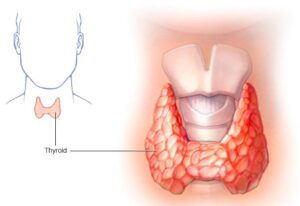Heads up
Hypothyroidism means that the thyroid gland can’t make enough thyroid hormone to keep the body running normally. People are hypothyroid if they have too little thyroid hormone in the blood. Common causes are autoimmune disease, such as Hashimoto’s thyroiditis, surgical removal of the thyroid, and radiation treatment.
Also called underactive thyroid, hypothyroidism affects women more frequently than men. It commonly affects people over the age of 60 years old, but it can begin at any age. It may be discovered through a routine blood test or after symptoms begin. Subclinical hypothyroidism is the name given to an early, mild form of the condition.
The disease gets more common with age. People over 60 years old experience it more frequently. Women are more likely to have an underactive thyroid. In fact, 1 in 8 women will develop hypothyroidism.
Causes
The most common cause of hypothyroidism is an autoimmune disorder known as Hashimoto’s thyroiditis. Autoimmune disorders occur when your immune system produces antibodies that attack your own tissues. Sometimes this process involves your thyroid gland other wise called as Hashimoto thyroiditis (Hashimoto’s thyroiditis, also known as Hashimoto’s disease actually damages your thyroid function. It’s also called chronic autoimmune lymphocytic thyroiditis. On an average in the United States, Hashimoto’s is the most common cause of hypothyroidism (an underactive thyroid).
Other causes of hypothyroidism include:
- Radiation therapy to the neck area. Treating certain cancers, such as lymphoma, requires radiation to the neck. Radiation damages the cells in the thyroid. This makes it more difficult for the gland to produce hormones.
- Radioactive iodine treatment. This treatment is commonly prescribed to people who have an overactive thyroid gland, a condition known as hyperthyroidism. However, radiation destroys the cells in the thyroid gland. This usually leads to hypothyroidism.
- Use of certain medications. Certain medicines to treat heart problems, psychiatric conditions, and cancer can sometimes affect the production of thyroid hormone. These include amiodarone (Cordarone, Pacerone), interferon alpha, and interleukin-2.
- Thyroid surgery. Surgery to remove the thyroid will lead to hypothyroidism. If only part of the thyroid is removed, the remaining gland may still be able to produce enough hormone for the body’s needs.
- Too little iodine in the diet. The thyroid needs iodine to produce thyroid hormone. Your body doesn’t make iodine, so you need to get it through your diet. Iodized table salt is rich in iodine. Other food sources of iodine include shellfish, saltwater fish, eggs, dairy products, and seaweed. Iodine deficiency is rare in the U.S.
- Pregnancy. The reason isn’t clear, but sometimes, inflammation of the thyroid occurs after pregnancy. This is called postpartum thyroiditis. Women with this condition usually have a severe increase in thyroid hormone levels followed by a sharp drop in thyroid hormone production. Most women with postpartum thyroiditis will regain their normal thyroid function.
- Problems with the thyroid at birth. Some babies may be born with a thyroid gland that did not develop correctly or does not work properly. This type of hypothyroidism is called congenital hypothyroidism. Most hospitals in the U.S. screen babies at birth for this disease.
- Pituitary gland damage or disorder. Rarely, a problem with the pituitary gland can interfere with the production of thyroid hormone. The pituitary gland makes a hormone, called thyroid-stimulating hormone (TSH), which tells your thyroid how much hormone it should make and release.
- Disorder of the hypothalamus. An extremely rare form of hypothyroidism can occur if the hypothalamus in the brain does not produce enough of a hormone called TRH. TRH affects the release of TSH from the pituitary gland.
Symptoms

Hypothyroidism signs and symptoms may include:
- Fatigue
- Increased sensitivity to cold
- Constipation
- Dry skin
- Weight gain
- Puffy face
- Hoarseness
- Muscle weakness
- Elevated blood cholesterol level
- Muscle aches, tenderness and stiffness
- Pain, stiffness or swelling in your joints
- Heavier than normal or irregular menstrual periods
- Thinning hair
- Slowed heart rate
- Depression
- Impaired memory
- Enlarged thyroid gland (goiter)
Babies with hypothyroidism may have no symptoms. If symptoms do occur, they can include:
- Cold hands and feet
- Constipation
- Extreme sleepiness
- Hoarse cry
- Little or no growth
- Low muscle tone (floppy infant)
- Persistent jaundice (yellowing of the skin and whites of the eyes)
- Poor feeding habits
- Puffy face
- Stomach bloating
- Swollen tongue
- Umbilical hernia
If left untreated, the following symptoms can manifest:
Hoarseness, puffiness in the face, thinned or missing eyebrow, slow heart rate, hearing loss










